A great past that explains our best future
Cementos Tudela Veguín S.A. Today it has 118 years of history since June 1898, the date of its constitution. At the time, it was a pioneer company by manufacturing a new product in Spain: artificial cement. At present, it continues to be a benchmark in the production of cements and limes at an international level, betting on innovation and an absolute commitment to nature.
Likewise, Cementos Tudela Veguín S.A. It is part of Masaveu Industria, the division of Corporación Masaveu dedicated to the manufacture of cement, lime, mortar and concrete, among other products.
History
At the end of the 19th century, numerous innovations and technical changes took place that led to this period being marked as the “Second Industrial Revolution”. Spain participated in them, and in particular Asturias, which experienced with unusual strength an intense creation of companies of all kinds. One of the most important and significant, both for what it would have resulted in itself and for the innovation it entailed, was Sociedad Anónima Tudela Veguín.
The foundation of the same was the initiative of Mr. Elías Masaveu Rivell, who on the occasion of the works that were to be carried out in the Port of El Musel, in Gijón, decided to establish a Tudela Veguín Stock Company, which was carried out on June 28, 1898 in a public deed before the notary of Oviedo D. Secundino de la Torre. The capital, 1,000,000 pesetas, was subscribed by the company Masaveu y Compañía, and the first Board of Directors was chaired by Mr. Elías Masaveu Rivell.
It might seem like one more company than those that were set up in that period if it weren’t for the fact that its purpose was absolutely new in Spain: the manufacture of artificial cement. Indeed, this company opened a totally new path in our country.
The founders
The initiative to create an artificial cement factory corresponded to the Sociedad Masaveu y Compañía, or Casa Masaveu. The term “House”, synonymous with business, had family connotations in “eight hundred”, since, indeed, family groups were still largely woven into kinship relationships. It is important to stop on this question, since commercial relations were based on personal credit, and this was based in turn on two pillars: personal honesty and financial solvency, family solidarity being fundamental to sustain it. In these years of the end of the century is when in Spain the change towards forms of limited liability begins to manifest itself, with Casa Masaveu being one of them.
D. Elías Masaveu Rivell was born in Castellar del Vallés in 1847. At the age of thirteen he came to Oviedo to work in the textile business that his uncle D. Pedro Masaveu Rovira, founder of Casa Masaveu, ran in 1840. There Thus began his business career, and in the textile trade he was able to gain knowledge and capital that would later allow him to undertake other projects.
We come to the last decade of the century. Asturias is abuzz with projects. Not only the coal mining and the steel industry are developing, but many other industrial branches that are crystallizing: food, shipbuilding, gas and electricity, chemistry, navigation and transportation, among others. Casa Masaveu participates in some of them, but is going to design its own project. Good interpreters of the reality that surrounds them, and with a long-range vision that allows them to intuit where there are favorable expectations – a key aspect for the entrepreneur – they decide to create a cement factory.
It would not take long to see their expectations confirmed: industrialization, urban growth and public works would make cement a key element.
Evolution of the company
As soon as the production with a Krupp oven started up, and in view of the good acceptance – despite the difficulty of placing a new product – it was decided to increase production. Two successive capital increases in 1901 – up to 5,000,000 pesetas – represented the financial injection that allowed the successive installation of four Fellner-Ziegler furnaces with a large production capacity. By then other cement factories had already appeared in other parts of Spain.
Due to the high consumption of coal, Casa Masaveu decided to participate in two mining companies, Carboneras de Valdecuna and Hulleras de Seguín y Olloniego (1918). The 1920s saw an appreciable pull in demand, and consequently in production, which multiplied by five. New cement producing groups appear in other regions, and the struggle for markets, despite regional dispersion and a certain compartmentalization, is accentuated.
The next investment impulse dates from 1928, which was made in light of the expectations of an increase in public works, more specifically in the Asturian ports. It is decided to build a wet rotary kiln that will double the production capacity, which was then 60,000 tons / year. The furnace was put into operation in 1931.
After the stoppage of the Civil War, a slow recovery began, taking a few years to exceed prewar levels. The increase in sales advises the expansion of production, which is carried out with the installation of a new furnace that entered service in 1948. But favorable expectations suggest an alternative solution, and a new plant is planned in Aboño (near the Port of El Musel) that would exploit the quarries in the area and which was inaugurated in 1953.
The rationalization of production does not only affect the production plants, and a curious fact occurs that speaks well of the professionalism and ingenuity of its technicians: on the occasion of the production of the Grandas de Salime dam, the world record for concreting. For this, a complex device had been formed in the factory, to which the movement of machinery to the work was added. The result was a staggering 120 cubic meters / hour.
The sixties are one of sales consolidation. They involve successive expansions of production capacity, both in Tudela Veguín and Aboño. In 1968, the company Cementos La Robla, S. A., with a capacity of 400,000 tons / year, and Cementos Valgrande joined the Tudela Veguín Group. A year later another cement factory is installed in Aboño; Cementos del Cantábrico, S. A.
The low price per unit of weight of cement makes transport a key element for its commercialization, and to expand its competitive radius, the Tudela Veguín Group carried out three important actions: the installation of silos on the Galician coast, the construction of ships adhoc for the feeding of said silos, and simultaneously the improvement of the storage means to the jetty.
Silos were erected for the first, highlighting among others, for their movement, those of the ports of Vigo, La Coruña and Villagarcía; For the latter, the E. N. Bazán was commissioned in 1968 to build two modern twin ships for the transport of cement in bulk with a capacity of 2,700 tons each. The “Cementer” and “Forger”, the first being, over time, adapted to unload the cargo properly bagged. Its success brought with it the construction of the “Encofrador” and “Cementos del Cantábrico”, with a transport capacity of 6,200 and 5,200 tons, respectively. Finally, the Torres promontory was drilled with a tunnel that connects, by means of a conveyor belt, the Aboño plants with the El Musel docks. The efficiency of the system resulted in a very important reduction in costs, which added a new element of rationalization to the company.
Similarly, a diversification of products is carried out, installing a white cement kiln with a capacity to produce 75,000 tons / year, a lime kiln mainly for the steel industry with a capacity of 350,000 tons / year, two calcined dolomite kilns with capacity of 150,000 tons / year, which will provide a product for multiple agricultural and industrial uses, and a facility to obtain 600,000 tons / year in aggregates of different granulation.
Regardless of the investments directly linked to cement factories and the distribution of this product, Cementos Tudela Veguín has created industrial companies in fields linked to the cement industry as important as prepared concrete, a sector in which it was a pioneer in Asturias and Galicia through of “General de Hormigones, SA”, and “Hormigones de Galicia, SA”, currently maintaining an important presence in both communities, as well as in Castilla y León.
In the Precast Concrete sector, Morteros Tudela Veguín is the leader in the Asturian market, extending its presence to neighboring provinces.
The use of iron and steel slag began in 1970 through Áridos Asturianos, S. A. benefiting a product that until that date was mostly thrown into the sea. Currently, and through EDERSA, the use of all the blast furnace slag produced at Arcelor’s facilities is managed.
In the sector of dry mortar, glue cement, plasters, etc., Morteros Tudela Veguín has three large factories: Asturias currently has the largest dry mortar plant in Spain; in Galicia and Castilla y León, using the latest technological advances in all of them.
MEJORA AMBIENTAL CONTINUA
Comprometidos con nuestro entorno natural
Cementos Tudela Veguín, dedicada a la fabricación de cementos y cales, forma parte de la división industrial de la Corporación Masaveu. Una de las 13 empresas que conforman Masaveu Industria.
Otras empresas de Masaveu Industria:
- Morteros: Morteros Tudela Veguín.
- Hormigones: General de Hormigones
- Áridos y Canteras: Cantera Castañera, Rebarco, Arenas de Bobia.
- Escorias: Edersa
- Laboratorios: Estabisol
La fabricación de cementos y clínker portland, como principales actividades de la rama industrial de Corporación Masaveu, son los procesos que mayor impacto generan en el medio ambiente y, por tanto, sobre los cuales se ha venido realizando un mayor esfuerzo inversor que permita minimizar su afección al entorno.
Cambio climático
La renovación tecnológica realizada en la última década ha permitido a Cementos Tudela Veguín obtener, por unidad de producto final, los niveles más bajos de emisión de CO2 del sector, colocándose, en algunos de los aspectos marcados como clave para la lucha contra el cambio climático, en una posición muy aventajada con respecto a los objetivos marcados a nivel mundial.
Inversiones ambientales
En la última década, la inversión para implantación de procesos productivos más eficientes, y por tanto con un menor impacto ambiental, así como en la implantación de medidas que minimicen los impactos inevitables derivados de nuestras actividad, acumula la cantidad de más de 138 M€, lo cual cuantifica de forma objetiva nuestro compromiso ambiental.
ISO 9001: Nos preocupa la calidad
Esta certificación nos permite como empresa garantizar a nuestros clientes un producto de calidad que cumple con las mejores prácticas en su proceso de producción.
En Tudela Veguín mantenemos un interés permanente por mejorar nuestro sistema de calidad y encontrar las posibles mejoras que devuelvan a nuestros clientes un valor añadido. Convencidos de que este es el mejor camino para crecer de una forma responsable, hemos conseguido la certificación ISO 9001 en nuestras fábricas de Tudela Veguín, Aboño, Narón y La Robla.
Igualmente, este sello de calidad representa la filosofía e inquietud de todo nuestro equipo humano con una dinámica de trabajo que favorezca las mejores prácticas y la identificación constante de puntos de mejora.
ISO 14001: El equilibrio con el medioambiente
Minimizar el impacto ambiental y favorecer la optimización de los recursos naturales. Esta certificación nos permite mantener un absoluto compromiso con nuestro entorno natural.
La implantación de un Sistema de Gestión Ambiental nos permite optimizar los recursos naturales, los residuos, el impacto ambiental que pudiéramos generar y todos aquellos riesgos naturales vinculados a nuestra actividad.
Del mismo modo, Tudela Veguín aumenta su implicación llevando a cabo numerosas actividades en sus fábricas que favorecen la recuperación de canteras, la reforestación de bosques y el fomento de buenas prácticas en todas las áreas de su organización.
Trabaja con nosotros
Forma parte de nuestro equipo
Cementos Tudela Veguín apuesta por la consolidación y el crecimiento contando con un excelente equipo humano. El trabajo en equipo, el esfuerzo y la profesionalidad, son los pilares básicos de esta compañía que día a día, trabaja para ofrecer el mejor producto del mercado. Si comparte nuestros valores y desea pertenecer a este equipo rellene el formulario que encontrará aquí y envíenoslo.
Actualidad
See all the news about Cementos Tudela Veguín

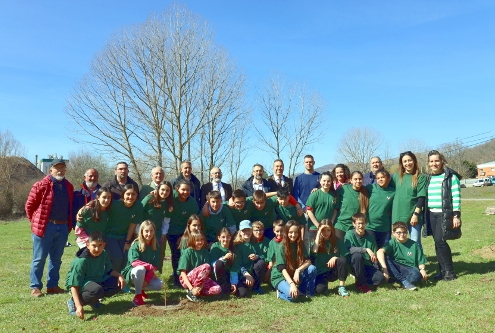
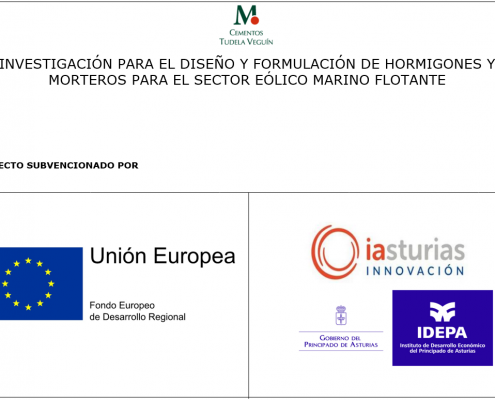
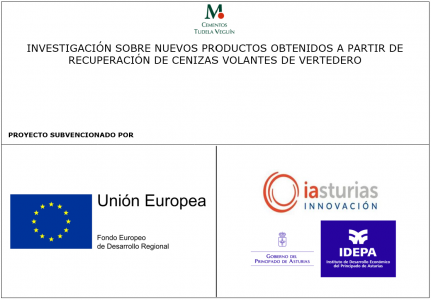
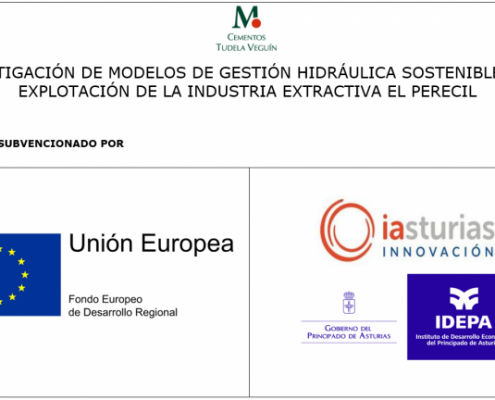
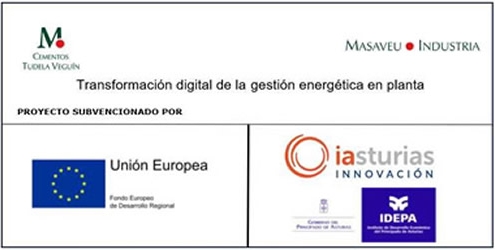
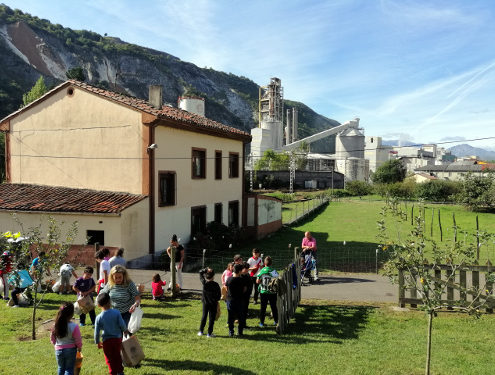

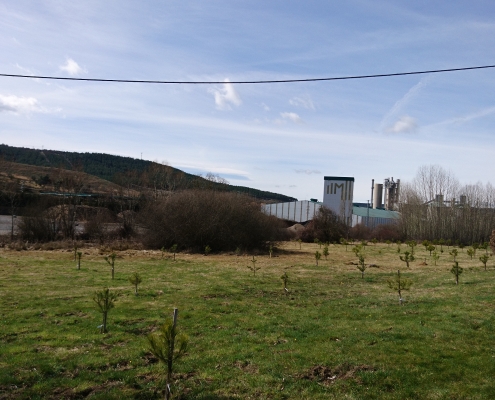
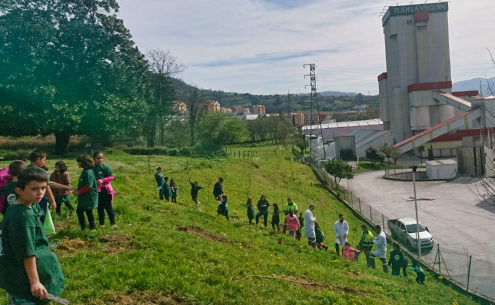
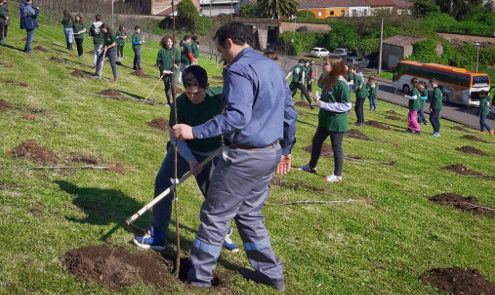
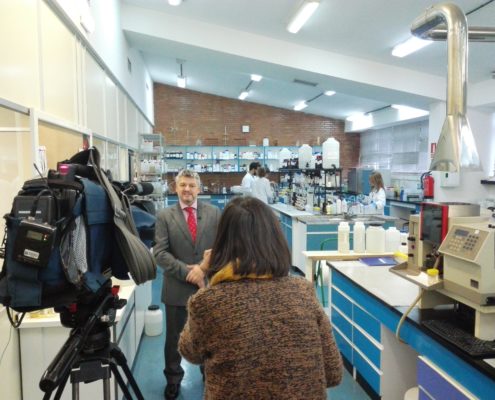
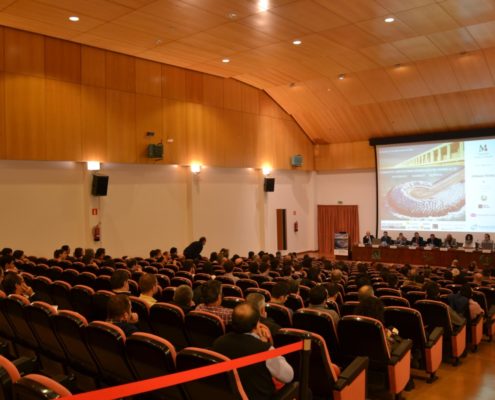
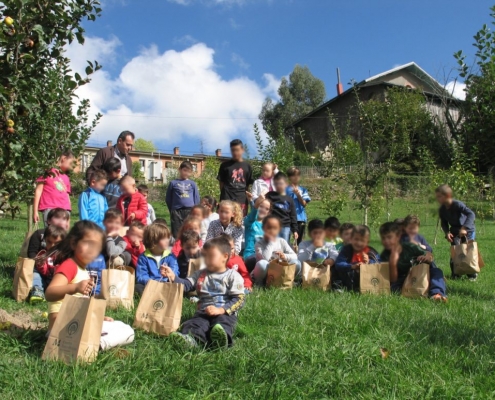
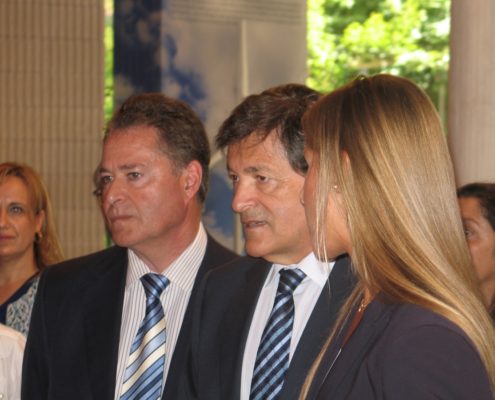
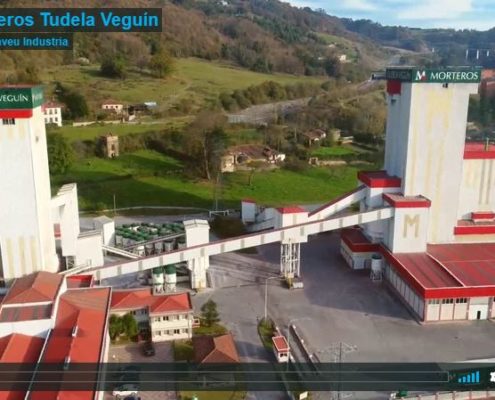
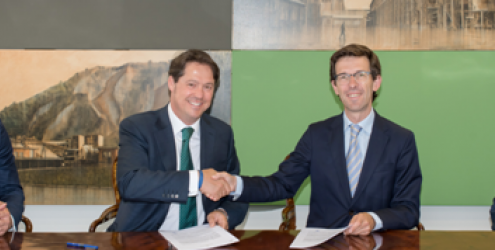
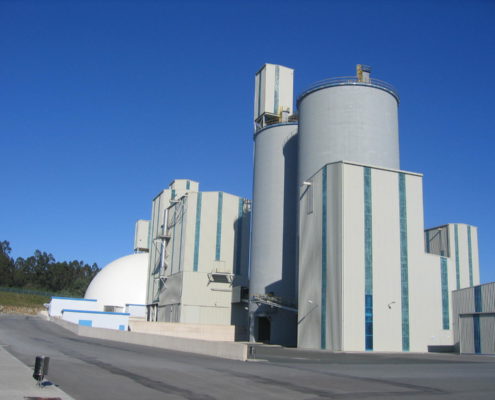
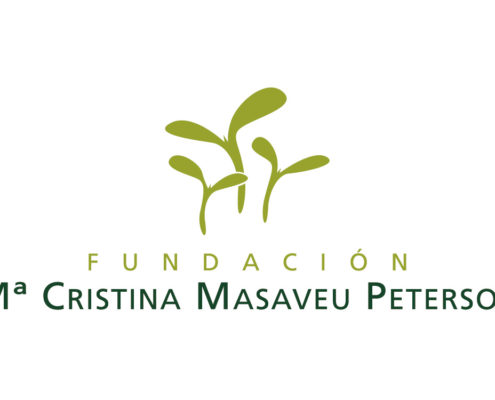

 Industria
Industria Bodegas
Bodegas Aparcamientos
Aparcamientos Inmobiliaria
Inmobiliaria Medicina
Medicina Internacional
Internacional Arte
Arte